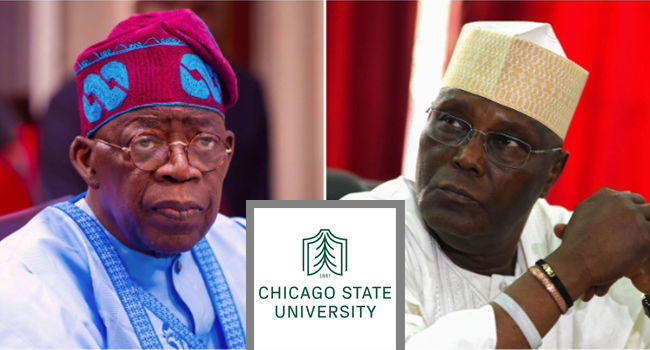President Bola Tinubu says Atiku Abubakar and the Peoples Democratic Party (PDP) are attempting the impossible by trying to get the supreme court to accept fresh evidence in his appeal.
Abubakar and the PDP are challenging Tinubu’s victory at the presidential poll and the verdict of the election tribunal upholding the outcome of the vote.
Abubakar had alleged that Tinubu’s academic records were fraught with discrepancies and forgeries.
His request for the US court for the northern district of Illinois to compel Chicago State University (CSU) to release Tinubu’s academic records has since been granted.
Read Also: Ohanaeze Hints Nnamdi Kanu Might Be Released Before End Of 2023
The PDP candidate is now seeking to introduce these records at the apex court.
However, in a counter affidavit and written address filed through his team of lawyers, led by Wole Olanipekun, the president said his academic records obtained from CSU cannot be considered by the supreme court.
Tinubu argued that the court cannot accept the written deposition of the CSU registrar who was not a witness before the tribunal and whose written statement was not activated through oral evidence as required under Section 41(1) of the First Schedule to the Electoral Act 2022.
“Where a written deposition is not activated by oral examination of the deponent before the court, same will not be acted upon by a court,” Tinubu said.
“It is not in doubt that the deponent of the deposition sought to be introduced as additional evidence was not orally examined at the lower court.
“The appellant has not made a case for the court to override the provision of Paragraph 41(1) of the First Schedule to the Electoral Act or referred to any law permitting the use of the deposition outside the confines of Paragraph 41(1) of the 1st Schedule.
“Appellants are attempting the impossible – thus, they have not stated whether the evidence is documentary or oral evidence because it fits into neither.”
The president said “the new document/deposition was neither pleaded nor listed at the lower court”.
“Even in regular civil proceedings, the court will still be required to fall back to originating processes in assessing the extent of its powers,” he said.
“None of the seven issues for determination presented by the appellants has any proximity to the disqualification of the respondents on the ground of forgery of any certificate whatsoever.
“Equally, there is no relief in the petition, seeking the disqualification of the respondent on the ground of forgery.”
He argued that the apex court cannot admit the deposition by the CSU’s registrar and an additional document (marked Exhibits C and D) because the deposition was not made before a court but in the office of Abubakar’s lawyer.
“The purported deposition was made, not before a court, but before a shorthand reporter, in a law office of the 1st appellant’s (Abubakar) counsel,” Tinubu claimed.

